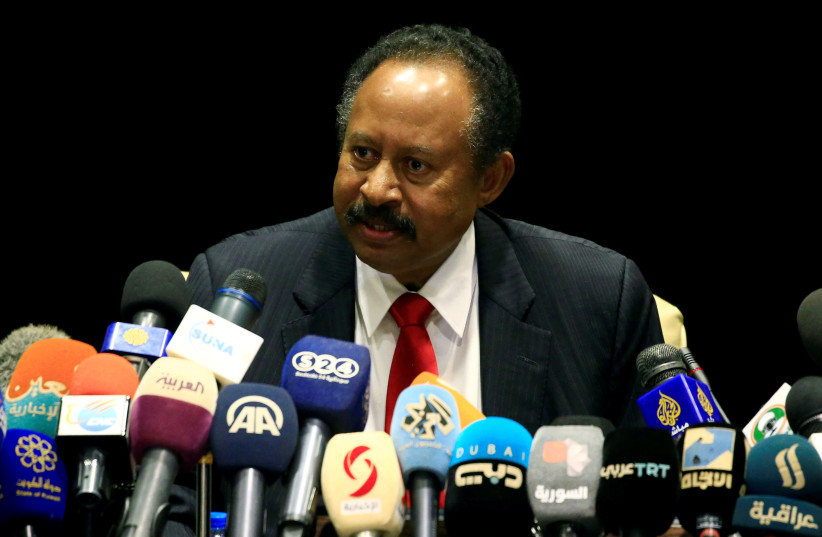Not everything is dark in the Middle East, Prime Minister Naftali Bennett told the United Nations last month, after spelling out the dangers emanating from Iran.
Along with Iran and other worrying trends in the region, “there are also rays of light,” he declared.
“First and foremost, the growing ties Israel is forging with Arab and Muslim countries,” he said. “Ties that began 42 years ago with Israel’s historic peace agreement with Egypt, continued 27 years ago with Israel’s peace agreement with Jordan, and even more recently with the Abraham Accords that normalized our relations with the United Arab Emirates, Bahrain and Morocco. More is to come.”
Bennett, rather oddly, left Sudan out of the Abraham Accords mix, even though that country also announced a normalization of ties with Israel last October. Was this just an innocent omission or something prophetic?
Judging by recent developments in Sudan, where the military abrogated a power-sharing agreement with civilian leaders, arrested the prime minister and his family and declared a state of emergency, Bennett’s omission might prove more prophecy than Freudian slip. The developments there definitely cast a shadow over normalization with Israel.

As State Department spokesman Ned Price said on Monday, “The many partners and allies we have spoken with have expressed a similar degree of alarm, concern, and condemnation of what we’ve seen take place in Khartoum in recent hours.... I think the normalization effort between Israel and Sudan is something that will have to be evaluated as we and as, of course, Israel watches very closely what happens in the coming hours and the coming days.”
Price’s comments came after Washington announced it was freezing $700 million in direct assistance to Sudan’s government in response to Monday’s coup.
If Israel was one of the partners that “expressed a similar degree of alarm, concern and condemnation” at the developments in Sudan – as Price put it – it has not made those feelings public. Jerusalem is anxiously watching what is happening in Sudan, but is doing so quietly.
If it weighs in on the side of General Abdel Fattah al-Burhan who orchestrated the coup – a driving force in the normalization with Israel and someone who met then Prime Minister Benjamin Netanyahu in Uganda in February 2020, a half-year before the Abraham Accords – then it risks alienating the masses of Sudanese fed up with military coups who have taken to the street in recent days in protest.
Yet if it weighs in on the side of arrested Prime Minister Abdalla Hamdok, who was not as enthusiastic as Burhan in the ties with Israel, then it risks alienating the military, which may now be in charge of the country going forward.
In this case, therefore, silence is the path of prudence.
AS IT STANDS, Sudan’s ties with Israel are largely seen there as the brainchild of the military, and have not garnered popular support to the degree that the Abraham Accords seem to have done in the UAE, Bahrain and even Morocco.
Sudanese military and civilian leaders shared power in a ruling council that was set up in April 2019 after the ouster of the dictator Omar al-Bashir. This council was to oversee transition to full civil rule, which was originally supposed to happen by November 17.
The military, more than the civilian leaders of the Sudan transitional government, were the strongest supporters of ties with Israel, understanding that this could be a boon in getting Sudan readmitted to the family of nations following Bashir’s atrocities.
For instance, as a result of the deal, the US removed Sudan’s designation as a state sponsor of terrorism, 27 years after it was so designated. This was badly desired by the Sudanese so they could begin to attract more foreign investment
The civilian leaders, on the contrary, were less enthusiastic about the ties with Israel, and the process of normalization has taken considerably longer with Sudan than it has with the other three Abraham Accord nations.
Those countries have established various levels of representation already in Israel – embassies in the case of the UAE and Bahrain, and a liaison office in Morocco’s case. Yet with Sudan, except for the repeal of a 1958 law boycotting Israel, little has been done to formalize the relations, with some attributing that to the disagreements in the ruling council and the precariousness of the government there.
In June, Axios reported that the Biden administration was urging Israel to start engaging with Sudan’s civilian leaders, not just the military – which it had done up to that point almost exclusively.
The coup comes as the Biden administration was in the process of trying to put together a formal signing ceremony in Washington to finalize the normalization agreement.
Sudan is not the first country where Israel is challenged by having peace with an authoritative Arab regime, but with that peace never being fully embraced by the masses. The same can be said, to a large degree, of Egypt, both under Hosni Mubarak, and also now under Abdel Fattah el-Sisi.
The US decision to halt the aid to Sudan as a result of the coup sends a clear signal to the military leadership there, and one which will definitely have ramifications for Israel as well.
It signals that the US will not accept the military takeover and that the process of lifting sanctions against Sudan and providing assistance to the government will be stopped if that situation is not reversed. And if Sudan’s military leadership sees that its ties with Israel are not reaping the benefit of getting sanctions relief or aid from Washington, it will likely rethink its normalization process with the Jewish state – a process that, in any event, has not exactly fired the imagination of the masses in Khartoum.
